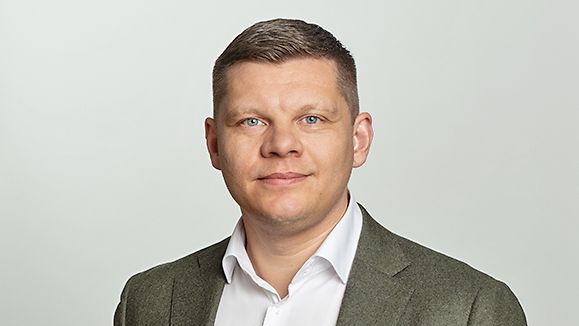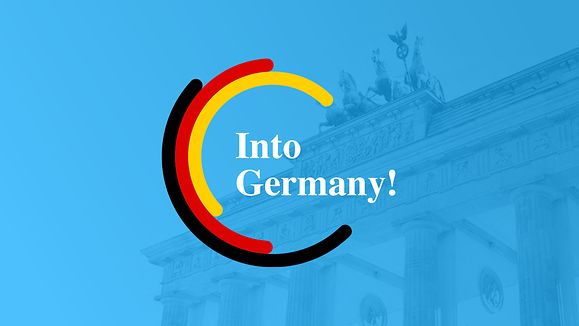Podcast INTO GERMANY!
Episode 29: A Fresh Start? New German Government, New Business Opportunities
- June 2025 -
Germany has a new government – and with it a new economic roadmap. So what’s in store for Europe’s largest economy?
Jun 16, 2025
On April 6, 2025, conservative Friedrich Merz was sworn in as Germany’s tenth chancellor. He leads a coalition of his center-right CDU_CSU alliance with the center-left SPD, two rivals united by a 144-page coalition agreement. Its top focus? Business, growth and competitiveness. What opportunities does this political shift offer for international companies looking to invest or expand in Germany? We get some answers from Julia Braune, CEO of Germany Trade & Invest (GTAI).
| Like Into Germany? You can get every episode on your favorite podcast platform: |
Our Guest

Julia Braune has been CEO of GTAI since February 2023. The organization – the Federal Republic of Germany’s international business promotion agency – is responsible helps foreign companies expand to and in Germany and German-based companies do business abroad.
Transcript of this episode
[Audio from Press conference – Chancellor Friedrich Merz, presenting new coalition]
Chancellor Friedrich Merz:
Hinter uns liegt ein hartes Stück Arbeit aber vor uns liegt ein starker Plan, mit dem wir unser Land wieder gemeinsam nach vorne bringen können. Deutschland bekommt einen handlungsfähige und eine handlungsstarke Regierung.
Behind us lies a a lot of hard work, but ahead of us we lies a solid plan with which, together, we’ll be able to move our country forward again. Germany is getting a strong and effective government.
Presenter:
That was the sound of a government changing. Conservative Chancellor Friedrich Merz was sworn into office on April 6, 2025. He leads a coalition of his own center-right alliance, the CDU-CSU, with the center-left Social Democratic Party, or SPD. Historically these two parties are rivals. But they’re able to work together thanks to a 144-page agreement setting out the government’s priorities and policies for the coming four-year legislative period.
Such agreements are common in the Federal Republic of Germany. Germany’s parliamentary system and largely proportional mode of representation mean that political adversaries need to cooperate to form majorities. This edition of the “coalition contract,” Koalitionsvertrag, as it's known in Germany, was negotiated BEFORE Friedrich Merz and the new governing cabinet were sworn in. And the sound bite we just heard was Merz unveiling it to Germany’s parliament.
[parliament, people applauding]
Hello and welcome to Into Germany, the German business podcast. I’m your host, Kelly O’Brien. The coalition agreement for the German government, led by Friedrich Merz, promises to be a political roadmap for Europe’s largest economy, and the emphasis is squarely on business, growth and prosperity. So what might that mean for international companies looking to expand to or in Germany? To get some detail, we’ll talk with Julia Braune. She’s the CEO of Germany Trade & Invest, the German government’s international business promotion agency.
Julia, thanks for joining us. Now one of the most significant changes came before the new government had EVEN TAKEN office. Last winter, the outgoing parliament changed the German constitution to allow the government to take out huge amounts of new credit. Julia, tell us please about this extra financial flexibility. How big of a deal IS this?
Julia Braune, GTAI:
Well, we're talking about half a trillion euros of extra spending power the government can call upon to invest in Germany's future. That will and can be infrastructure and also 100 million euros are allocated to climate-related investments, for example, to advance Germany's transition to renewable and sustainable energy. And just to give you a feeling, what does it mean half a trillion for Germany? By comparison, Germany's GDP is around 4.3 trillion euros. Government expenditures run just over 2 trillion euros, and revenues including municipalities and social income just under that amount. So you see the extra leeway is indeed very significant. And in addition, defense spending has been completely exempted from debt limits and regional and local authorities will be allowed to take out new lines of credit as well. So we believe considerable new funds will be available that businesses can take advantage of.
Presenter:
You mention defense and security. Why are they becoming increasingly important? And what opportunities might they offer international companies?
Julia Braune, GTAI:
Well, we see a changed geopolitical landscape, a war in Europe, just so to say, in the neighborhood, the aggression of Russia against Ukraine. And this has changed a lot of the perception of security in Europe. As a consequence, countries throughout Europe and the EU are striving for greater security autonomy. Already on the first page of the coalition agreement the government is pledging to strengthen our defense and deterrence capabilities in order to secure freedom and peace and this marks the high priority security has and the defense autonomy for the German government. So when we look at the figures, EU member states spend some 326 billion euros on defense in 2024. These expenditures have been rising over the years, but certainly they will get another massive boost in the years to come, because unfortunately, and sad as it is, we cannot expect the geopolitical environment and the threats we are facing to vanish. Yes, indeed, defense and security are a high priority. And this goes along with investments in this sector.
Presenter:
Can you share some examples of the kinds of innovations we’re seeing in Germany’s defense tech sector?
Julia Braune, GTAI:
So there are a variety of sectors which look set for expansion in which international companies can prosper in Germany and I want to just name a few: that is AI security applications, cyber security and dual-purpose drones. And there are already some spectacular success stories in Germany. The Munich Start up Helsing for example which applies AI to defense is one of Germany's unicorns and a company called Quantum Systems, they specialize in artificial intelligence, aerial intelligence drones. They just joined the ranks of unicorns as well. Both of these companies are examples that international companies or startups could follow their lead when they expand to Germany.
Presenter:
The government under Chancellor Merz is prioritizing economic prosperity. The coalition agreement BEGINS by discussing the business landscape. And the new government promises an “investment offensive”. One main component is the ten BILLION euro “Germany fund”. The government hopes it will lead to at least 90 billion in additional private investments. Decision-makers in Berlin are also extending the “future Fund,” originally launched to support startups and high-growth sectors, beyond 2030.
So, Julia, what’s your take on this “investment offensive”, especially the new Germany Fund?
Julia Braune, GTAI:
As laid out in the coalition agreement, the Germany fund is a EUR 10 billion state instrument to support innovation, especially for small medium-sized companies. And the government with it aims to unleash substantial additional private investment, injecting as much as 100 billion euros into capital markets. One of the biggest hurdles for innovative young companies is securing financing, so that they can scale up. The German state has been aware of this challenge for quite some time, and the Germany Fund extends and intensifies the policy to encourage these necessary venture capital investments. And this sort of state support, we believe, is very important along with the size of the German market and also the stability of the country and our excellent business environment. And it is a reason why companies continue to expand in and to Germany in turbulent economic times.
Presenter:
You mentioned foreign direct investment. Germany Trade and Invest recently published its annual survey of foreign direct investment in Germany. It’s a bit of a mixed bag. Could you give us an executive summary?
Julia Braune, GTAI:
Germany attracted 1,724 expansion projects by international companies in 2024. That was down slightly from 2023. Those projects were valued at over EUR 23 billion. The drop in volume was larger, but however, 2023 was a really good year and smashed all previous records. So in the longer term we see a generally consistently high level of international business expansion since the coronavirus pandemic. And, well we are a bit proud that Germany also continually outperforms fellow European countries due to its strong industrial base and the landscape of SMEs that is the strong backbone of our country.
This year's study on the foreign direct investments also revealed a few interesting trends. Big multinationals account for an increasing proportion of international business expansions into Germany. That's of course good news for the small medium enterprises as well as they are important partners in the supply chains. And businesses that come to Germany are increasingly active in the digital sector, and we also see significant gains in the areas of manufacturing and research and development.
Presenter:
Okay, before we continue with our analysis with Julia Braune. Let’s look at some examples of what has been going on in the German business world recently in our news round-up.
Green Light
Germany’s Ministry for Economic Affairs and Energy has given the ultimate go-ahead for state assistance for a EUR 6 billion expansion by chipmaker Infineon in Dresden. The semiconductor manufacturer’s Smart Port Fab will bolster European microelectronics supply chains and it underscores the eastern German regional state of Saxony’s status as Europe’s leading semiconductor hub. The company is receiving EUR 920 million in state support for the project.
Innovation Fund
There’s lots of state support for business in the west as well as in the east of Germany. The regional state of Hessen is investing EUR 1 billion in future technologies and ideas. The Hessen Fund debuted in late April and is explicitly aimed at start-ups as well as established SMEs. The money is intended to finance sustainable, innovative companies with good growth potential that want to shake up the market.
Port Progress
Container traffic at Germany’s largest port, the Port of Hamburg, was up over five percent year on year during the first quarter of 2025. Nearly one and a half million standard containers passed through the port of Hamburg in the first three months of 2025. That’s according to the port authority HHLA. Revenue was also up 18.8 percent, reaching EUR 435.6 million. The growth was down largely to increased activity from China.
Games People Play
Survival action role-playing game Enshrouded, which was created by the Keen Games studio, has won the 2025 German Computer Games Prize. In it, players take on the role of the last hope of an ancient civilization battling against the Shroud, a creeping blight that absorbs and mutates all life it encounters. The price has been awarded every year since 2009 to recognize creativity and innovation in the German gaming industry. The sector is currently worth some EUR 9.4 billion.
And finally, Political Transition
Germans went to the polls in late February for national elections that reconfigured the constellation of power in Europe’s largest economy. The conservative alliance CDU-CSU won 28.5 percent of the vote making it the largest faction in Germany’s parliament. It hammered out a coalition with the Social Democrats, who got 16.4 percent of the vote to form a parliamentary majority. Conservative leader Friedrich Merz became the Federal Republic of Germany’s tenth chancellor in early May.
Presenter:
So those are some of the things going on in Germany recently. Now let’s return to Julia Braune and move on to address some pain points. One is affordable energy prices for industry and businesses in Germany. Although prices have recovered since the highs after Russia invaded Ukraine, they remain at a level that burdens both households and industry. Julia, how does the new government intend to address this challenge?
Julia Braune, GTAI:
Ensuring affordable energy for businesses and consumers is one of the first pledges in the coalition agreement. One immediate reduction measure is a cap on fees for using the energy grid. The agreement also foresees special relief measures for energy-intensive industries. And the new German government will further advance the transition towards renewable energy. In so far, the expansion of renewable energies is a part of the plan to reduce energy prices. And one good example is the plan to streamline permitting procedures for wind turbines and solar power installation. Altogether, I would say it is important to remember that the transition to clean energy is a long-term project and will, in the end, of course, over the time also bring the prices down. But what we also see and hear from investors, that the availability of renewable energy is already a decisive factor in some international companies' decision to expand to Germany.
Presenter:
You mentioned streamlined procedures. Bureaucracy is another impediment to growth. Everyone agrees on that. Could you give us an example of what the new government wants to do about this problem?
Julia Braune, GTAI:
In addition to simplifying permitting processes, one very interesting example that is directly relevant to our work and activities at Germany Trade& Invest is the process for registering new businesses. The government has promised to create a so-called one-stop-shop, combining all the formalities on one internet platform. That includes, for example, notaries, tax authorities and trade offices. The goal is to make it possible to register a company in Germany within 24 hours. So the battle against bureaucracy has officially been conceived in the coalition agreement – we're very happy to see that – as part of Germany's efforts to encourage innovation. And I believe innovative young entrepreneurs are among those poised to benefit most from the cuts in red tape.
Presenter:
Tax laws are also to be revised to strengthen competitiveness and promote economic growth in the long term. The new leadership promises to lower Germany’s corporation tax, the Körperschaftssteuer. How much of a boost do you expect that to be?
Julia Braune, GTAI:
The government under the new Chancellor Friedrich Merz has been very specific about it. They pledged to reduce this tax by 1% a year for five years, starting already in 2028. The tax is currently at 15% on all taxable income for businesses. So what does it mean? In 2023 revenues amounted to EUR 45 billion. So we're talking really about substantial amounts that businesses in Germany will permitted to retain in the future. And I think this, once we have this tax reduction, will make it really even more profitable and attractive to do business here in Germany.
Presenter:
Finally, let’s look at the sectors the new government wants to prioritize. The agreement names a number of areas as specific focuses – for instance, AI or aerospace. How much of this is new, and how much is an extension of previous government orientations?
Julia Braune, GTAI:
It's a mix. The emphasis on defense and security is certainly new, as we've already talked about the changed geopolitical situation. And other areas like AI, artificial intelligence, are being stressed to a greater extent than ever before.
It is significant, I think, in this context that the new German government is creating a ministry especially for digitalization, whereas digital affairs were previously subsumed under the Ministry for Transport. So here we see a change and, yes, a decision to really advance digitalization in Germany in the coming legislative period. There are also areas of continuity. I've already mentioned the transformation of the energy sector, and especially green hydrogen as one important part of the future energy mix will continue to play a role, with a strong emphasis by the new government on the expansion of the networks for hydrogen as an energy carrier and as a fuel for heavy vehicles.
Having said that, our new Federal Minister for Economic Affairs and Energy, Katharina Reiche, comes from the energy sector. She has substantial experience in this field and I believe we can expect her to set her own agenda and put her mark in this area. And what's further more important, she is putting growth of the German economy in the focus. And this will be a strong sign for international companies who want to set up their business in Germany.
Presenter:
So, continuity in some areas, but also clear signals of change — especially when it comes to growth and innovation. Julia, thank you for walking us through the new government’s plans. And now let’s have a brief look at HOW GERMANY WORKS:
HOW GERMANY WORKS
As Julia Braune alluded to, the new German government has meant a shuffle in the responsibilities of the national ministries, as is often the case when power changes hands in Germany. They reflect governmental priorities. The Economy Ministry is now officially known as the Ministry for Economic Affairs and Energy. A novel Ministry of Digital Affairs and State Modernization has been created. Outer space is an explicit part of the German education and research ministry, which has been renamed the Ministry of Research, Technology and Space. And THAT’S HOW GERMANY WORKS.
With that, we’ve arrived at the end of another episode of Into Germany. We hope you’ve enjoyed hearing about the changes in the country, and as always, if you think YOUR business could work in Europe’s largest economy, please get in touch with Germany Trade and Invest. We’ll be happy to advise you … at no cost because we’re a government agency. Let’s discuss the situation at gtai.com. We’re also keen on your opinions, suggestions and questions. Please leave a comment in your favorite podcast app or drop us a line. You’ll find all the details in our show notes.
So until next time, take care, Auf Wiederhören and remember GERMANY MEANS BUSINESS

